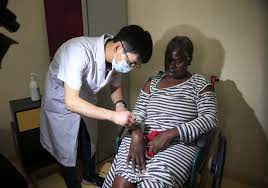Acupuncture, an age-old healing practice, is gaining popularity in Zimbabwe thanks to the introduction of Traditional Chinese Medicine (TCM) and the availability of locally accessible acupuncture clinics. Tatenda Chimbunde, an acupuncturist who graduated from a TCM and Acupuncture personnel training course at the Zimbabwe-China TCM and Acupuncture Center, is one of many healthcare professionals helping to meet the growing demand for TCM in Zimbabwe.
Chimbunde is part of a new generation of healthcare workers who are receiving training in acupuncture and other TCM therapies as part of efforts to offer Zimbabweans affordable medical alternatives. In December, she was one of 10 healthcare workers who graduated from the acupuncture training course at the Zimbabwe-China TCM and Acupuncture Center in Harare.
Chimbunde says that learning acupuncture was initially overwhelming, but she quickly learned about the origins of acupuncture and how it is used in therapeutics. In addition to acupuncture, Chimbunde learned about other TCM techniques, such as cupping, moxibustion, scrapping, and massage. She has seen patients recover from a variety of ailments, including migraine headaches, lower back pain, and joint pains.
Besides her qualifications as a pharmacist and acupuncturist, Chimbunde has also immersed herself in Chinese culture by learning the language and martial arts. She believes that learning the Chinese language has widened her horizon and has given her a deeper understanding of TCM.
The Zimbabwe-China TCM and Acupuncture Center was established in 2020 as part of efforts to offer Zimbabweans affordable medical alternatives. The introduction of the acupuncture training course was meant to make the service more accessible to Zimbabweans as more people seek TCM treatment. The center is staffed by Chinese doctors and local healthcare workers who have received training in TCM.
Chimbunde’s mentor is Zhu Wei, a TCM doctor and the head of the Chinese medical team in Zimbabwe. Zhu taught Chimbunde acupuncture, moxibustion, scrapping, cupping, and massage. According to Zhu, Chimbunde has learned a lot, and she is now able to provide acupuncture treatment to patients.
Zimbabwe and China share a long history of cooperation in the health sector. Since 1985, China has dispatched 19 medical teams to the southern African country. Traditional knowledge systems and medicines play an important role in Zimbabwe as an affordable source of treatment.
TCM is gaining popularity in Zimbabwe, and many people are seeking acupuncture treatment as a way to address their health concerns. The availability of locally accessible TCM clinics and the training of local healthcare workers in TCM therapies have made it possible for more Zimbabweans to access these medical alternatives.
In addition to acupuncture, TCM includes a range of other therapies, such as cupping, moxibustion, and massage. These therapies are based on the principles of Chinese medicine, which views the body as a whole and emphasizes the importance of maintaining balance and harmony.
The effectiveness of TCM therapies, including acupuncture, is still a topic of debate in the medical community. While some studies have shown that acupuncture can be an effective treatment for certain conditions, others have found no significant benefits.
Despite this, many people in Zimbabwe and other countries continue to seek out TCM therapies as a way to address their health concerns. The availability of locally accessible TCM clinics and the training of local healthcare workers in TCM therapies have made it possible for more people to access these medical alternatives.
In conclusion, the introduction of TCM and the availability of locally accessible acupuncture clinics are making a difference in Zimbabwean healthcare. The training of local healthcare workers in TCM therapies, such as acupuncture, cupping, and moxibustion,
